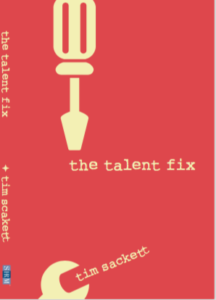Do you remember when getting stuck in LinkedIn Jail was all the rage!? I do! It was awful! There you were stuck on the outside looking in not being able to use a valuable tool you used every day to help you do your job.
I’m in Indeed Jail!
It’s somewhat like being in LinkedIn Jail, but different. When you got put into LinkedIn Jail, LinkedIn decided that that right thing to do was to let us know why we were in jail, and then, specifically, how do you get yourself out of LinkedIn Jail. Seems like a good business strategy.
How does Indeed get you all of those great candidates?
The Indeed model built a decade ago was freaking brilliant! Basically, the idea was scrap all the jobs from all the career sites so candidates will have one place to go to search for jobs. No one understood Google SEO at the time, so they scraped the jobs, then bought all the SEO and owned the space.
So, any candidate who was searching for a job on Google the first thing that would come up, always, was an Indeed link. They trained entire generations to search for jobs by going to Indeed. Brilliant!
Now, Google came along eventually and woke up to this and said, “Hey, wait, candidates are searching on Google for things like “Jobs near me” and we are sending them to Indeed for things that aren’t even what they are truly looking for. We can do this better!” Hello, Google for Jobs!
Google for Jobs decided “candidates are the most important thing”. Your Indeed sales rep will tell you this as well, although, they didn’t ever say this until Google for Jobs came along! So, Google changes the game, stops indexing Indeed (which is like a death sentence to companies that rely on Google search traffic), and says we can deliver a better job search for candidates.
So, Indeed is basically a dead man walking, but they have this window of time when we still have the entire world trained to go to Indeed and not Google. So, how do you take advantage of this phenomenon? INDEED JAIL!!! Cut off the non-suspecting companies of their free traffic and charge them money before they realize they don’t really need to do this because Google will give them the traffic they need.
So, what’s Indeed Jail?
Indeed Jail is when Indeed makes the decision to stop scrapping your career site and posting your jobs on Indeed. Almost every company at some point in the past decade has enjoyed a lot of free, organic traffic from having their job posting on Indeed. It was an AWESOME business strategy. It basically followed LinkedIn’s strategy, who followed basic drug dealing strategy.
Get people hooked on your product, then take it away and make them pay if they want it. I don’t say that to be mean! It freaking works really, really well! LinkedIn is a multi-Billion dollar company that got bought by Microsoft.
Indeed Jail is when Indeed stops giving you those free hits! Now, they just don’t take it away for no reason. My reason to be cut off, I was told, was because of a magical, mythical division within Indeed called “Search Quality”. My Indeed Rep didn’t shut me off, no! It was “Search Quality” who shut me off, and my Indeed Rep has absolutely nothing to do with Search Quality. In fact, they run almost as a separate company, locked away in an undisclosed, secret location!
My “Search Quality” issue was I’m a staffing company. An example of my issue is we work with a major employer to fill contract positions, not a position they would hire direct. The company gave us a job description for the contract position, which was basically the exact same JD they use to hire direct. Because the direct employer has priority at Indeed, and my posting was ‘too similar” my ‘search quality’ was bad.
Okay, I’m in Jail, Ouch, that hurts! Help me fix it!
Let me say, I’m paying and have paid money to Indeed for various products, so it’s not like I’m not a customer. So, when you ask someone you’re paying for help, you expect help. But Indeed has no interest in helping you fix your search quality issue because that would mean you would get the product for free again!
I would love to tell you this is a staffing industry only issue, but it’s not. Little by little, and I have specific examples, corporate Talent Acquisition is also getting hit with ‘search quality’ issues and losing their free traffic from Indeed.
How can that be!?
Believe me, the corporate TA leaders I’m talking to are wondering the same thing. In one example, an Ohio-based employer is hiring hundreds of sales-related positions per year. They don’t use any staffing or RPO vendors, all the work is done in-house for direct positions. They have a big growth initiative so they went from maybe 50 openings to 200 openings, and Indeed cut them off! Because of ‘search quality’, and again, their rep would/could not help them.
I have a feeling this isn’t going to end well for Indeed. Right now they’re flying high! Going to hire thousands of more employees, which makes complete sense, because if you shut everyone off of free traffic, you’ll have a lot of TA pros panicking and buying Indeed products. At least until they discover it continues to cost more for less and less traffic as Google no longer indexes Indeed.
I’ve sent emails to the highest reaches of Indeed, pleading for help, and the only response I got back was from my rep offering to sell me more products!
I explained that I want this to be positive! Show me how to fix me, and I’ll show others how to fix themselves! Along the way, it’s a win/win since the more we understand about the Indeed products and services and feel like a vendor is truly helping us, we (as an industry) will support them!
Crickets!!! Crickets, I say, Chris Hyams!!!
So, what should you do to NOT get yourself in Indeed Jail?
1. Never pay one dime to Indeed!!!
- So one thing that has been pretty consistent with everyone I’ve spoken to that got put into Indeed Jail is that they were all (100%) paying customers of Indeed. Almost, like Indeed knew we were willing to pay for traffic, so they put us into jail on purpose! Up until the point of becoming a paid Indeed customer, none of the people I spoke ever had issues with being put in Indeed Jail!
2. Make sure you understand what is ‘bad’ search quality for Indeed. Good luck with this!
3. Enjoy the free traffic while you have it because eventually everyone will be shut off. Drug dealing works because we get addicted. You’re currently addicted to free Indeed traffic. That isn’t a sustainable model for a business.
So, what do you do if you’re already in Indeed Jail?
1. Understand you’re not alone.
2. Understand that your true reality is you can live without Indeed traffic, and slowly but surely the traffic you get from Google will be greater. So, focus on ensuring your ATS and Jobs are as aligned as possible with the Google Job Schema – it’s super important!
3. Understand if you want more Indeed hits, you better get ready to pay for them from Indeed.
4. Understand Indeed has no vested interested in helping you fix your search quality issue, even if you’re a paid customer because it costs them money.
5. Look at Programmatic Job Advertising tools like: JobAdX, Talroo, Appcast, etc. Increase your posting strategy with sites like ZipRecruiter, CareerBuilder, Monster, LinkedIn, etc. Invest in your own database with some talent rediscovery tools, use CRM technology, build and nurture your pipelines of talent.
My Offer Still Stands!
Chris Hyams, the President of Indeed, get your team to help fix my stuff and I’ll be your biggest fan in advocating and teaching others how to do right by candidates and by Indeed to make the world a better place. That’s all I ever wanted, for you to just help me. Help a paying customer fix their stuff. But you refused.
#FreeTimSackett


